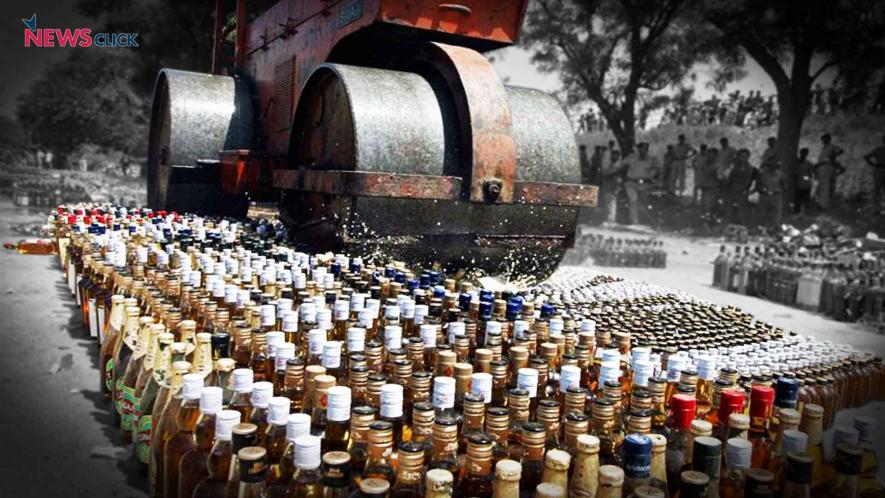Under BJP Rule in Gujarat, Prohibition Has Become a Farce

Newsclick Image by Nitesh Kumar
The Bombay Prohibition Act, 1949, an act which bans liquor, was enacted just a few months after the assassination of Mahatma Gandhi. It has been in force in Gujarat since 1960 when the state was formally established. However, the implementation has remained limited only to papers by all anecdotal evidence over the years. Despite having a separate state prohibition department, an illegal market of liquor has always been active across Gujarat, perhaps because of the profound nexus between the police department personnel and bootleggers, which contributed for the rise in the number of gangsters and mafias. And, like every lucrative business, politicians of all hues have been involved in it too. This makes it possible for anyone to buy any sort of liquor at any given time, but only at inflated rates when compared with the costs in neighboring states. Also, it is a disenchanting fact that many residents of Gujarat have to travel outside the state’s boundaries for consumption of alcohol of their choice. Union territory Daman & Diu has been the favorite destination for many Gujaratis for legal consumption of alcohol.
After the poll dates for December Assembly Elections were announced, there has been widespread boost in supply of different sorts of alcohol across the state. It has been reported that as much as about 9.61 lakh litres of liquor had been seized across the state (till 3 December), by the surveillance appointed by the Election Commission.
Since 2003, the Prohibition Act has been amended four times by the Bharatiya Janata Party government. As per the present Gujarat Prohibition Act, 2017, persons found guilty of involvement in manufacture, purchase, sale or transport of liquor would face imprisonment up to 10 years and a fine up to Rs 5 lakh. The latest amendment has been made the punishment more stringent over the previous one according to which the maximum jail term was three years. However, prohibition has only remained on papers. This resulted in a massive number of cases piled up with courts. For instance, as per the latest figures compiled by Gujarat High Court administration, as many as 1,58,727 criminal cases under the Prohibition Act are pending with courts in the state.
Apart from this, prohibition has also resulted in tragic deaths of people due to consumption of spurious liquor. In 1989 and 1990, 149 people were killed in Vadodara and Junagadh. After a decade, in 2009, 156 people died due to similar reasons in Ahmedabad. And again in 2016, due to consumption of hooch (locally made alcohol) 21 migrant textile workers were killed in villages of Surat district.
Bootleggers Mafia
In the 1980s and early 1990s, the bootleggers mafia was dominated by a don, Abdul Latif Sheikh who was based in Ahmedabad. Gujarat police had registered more than 200 criminal cases against Latif and his gang on various charges including murders, kidnappings and bootlegging. Latif was allegedly supported by the then politicians which contributed in the expansion of his liquor empire. However, Latif’s high profile arrest in 1995 did not put an end to the illegal liquor trade in the state. In fact, it has further expanded. According to a reply by the BJP government in the state Assembly, between 2010 and 2016, liquor worth Rs 316 crore was seized and worth Rs 211 crore destroyed across the state.
In recent times, Pramod Tandel, brother-in-law of Lalu Patel, BJP MP from Daman, has been accused by Gujarat police in a number of cases under prohibition. Allegedly, Tandel has been involved in a bootlegging mafia and in the illegal supply of liquor from Daman into Gujarat. In July 2017, the Enforcement Directorate had attached Tandel’s property worth tens of crores under the prevention of money laundering act.
It is also a fact that many villages in the state are known for brewing their own country liquor. Back in 2014, senior Congress leader Kapil Sibal had alleged that the prevalent illicit liquor trade in Gujarat was worth of Rs 30,000 crore in black money. He alleged that the then Narendra Modi’s government had benefitted from the liquor trade.
“Modi’s administration, far from doing anything about it, benefits from it. Surat guzzles 50,000 litres per day and almost 70 per cent of the 18,000-plus villages in the state brew their own country liquor. The ban on liquor is not lifted because of vested interests. Prohibition, as a policy, brews corruption,” Sibal was quoted saying by the Telegraph.
Nilanjan Mukhopadhyay, journalist, wrote about the easy availability of ‘sharabi’ in the state. When he once interviewed Narendra Modi, Chief Minister of Gujarat at that time, Modi had called ‘Prohibition’ as a ‘cultural thing’ in Gujarat. However, in the nineteen-year uninterrupted rule, the BJP government has not attempted to review the Prohibition law, despite the visible thousands of crores of illegal liquor market. Also, reportedly, the Gujarat High Court had observed that the prohibition policy did not yield “positive results” and ineffectiveness of the policy implementation.
In the ongoing assembly election campaigning, political parties are not talking about prohibition. Perhaps the leaders are comfortable with the prevailing illegality around liquor.
Get the latest reports & analysis with people's perspective on Protests, movements & deep analytical videos, discussions of the current affairs in your Telegram app. Subscribe to NewsClick's Telegram channel & get Real-Time updates on stories, as they get published on our website.























